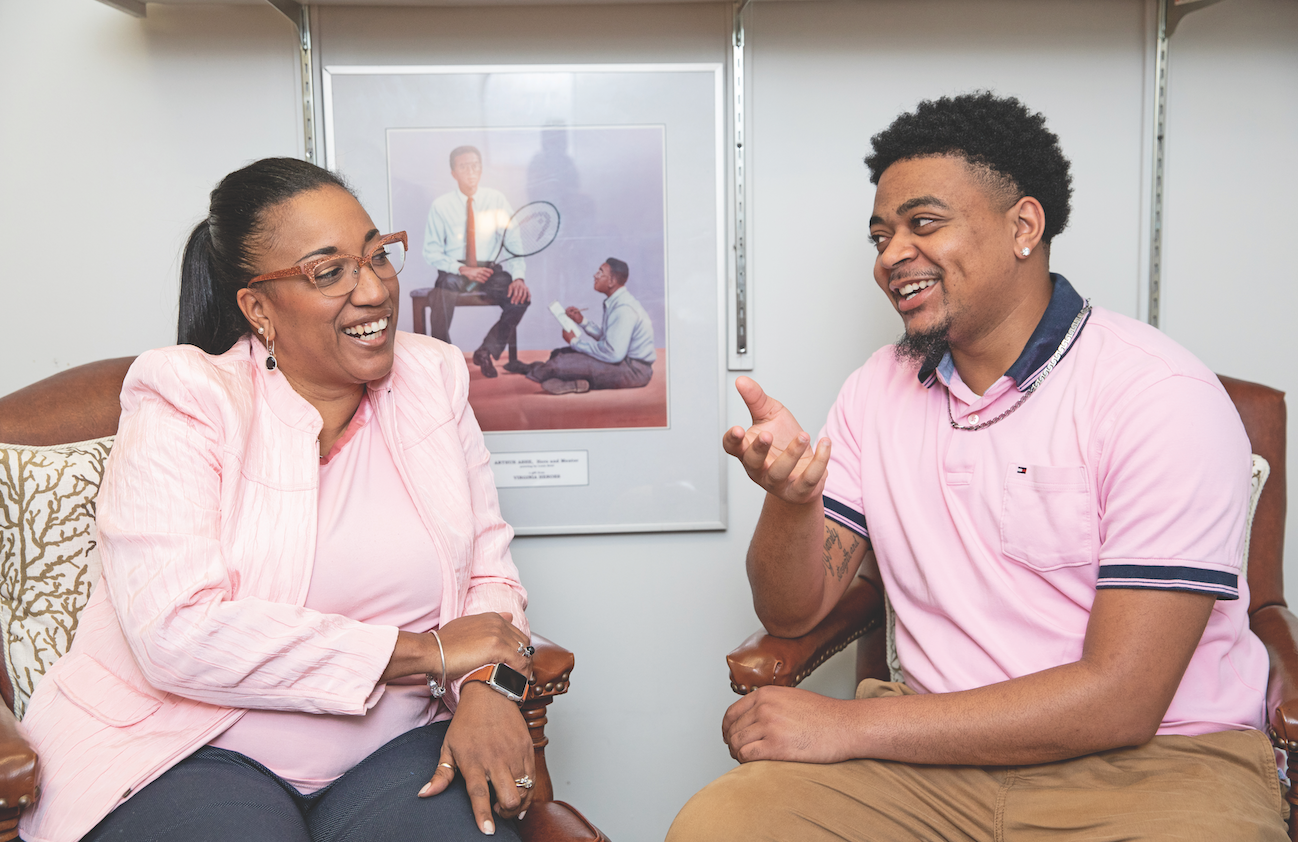

Dr. Erica Brown-Meredith ’95 and Darius Baskerville ’20 discuss his future.
“I believe you can make a difference in his life. I need you to make sure he graduates.”
It was my first official day as a member of the social work faculty at Longwood, and my department chair at the time, Dr. Theresa Clark, M.S. ’88, had asked me to come to her office. She wanted to introduce me to Darius Baskerville, a young man who needed someone to help get him on the right track. He wasn’t experiencing a minor derailment: He was unable to pass any of his classes the previous semester.
Even so, Dr. Clark believed in Darius. She knew he had the intelligence and the determination to earn a college degree, but she was also aware of the extra support he needed to reach his goal. She also had faith in me, just as she had when she was my mentor and I had gotten off to a rocky start during my first year at Longwood. She knew that I would believe in Darius in the same way she believed in me.
It’s always rewarding to mentor the strongest students, and, of course, as educators we all do that. But there’s also a real changing-of-life trajectory with those who are struggling.
I’ll admit I was fearful that day as I walked down the hall to her office. This was my first faculty appointment. I’d never mentored a college student. I wondered if it was even possible for someone with such a low GPA to recover.
I don’t remember exactly what Darius said that day. I don’t remember what he was wearing. What I do remember is seeing his face. It was the face of a young man who may not have been broken, but he was undeniably lost. I saw his pain and resentment, but I also saw determination and hope. I saw fight in his eyes.
Both Darius and I fully trusted Dr. Clark. If she thought we could do this, then we could. So we got to work.
I met with Darius twice a week during the first semester I was his mentor.
I knew that some of the things Darius needed weren’t strictly academic. As a first-generation college student, he couldn’t rely on his family for guidance or even some of the basic skills required to be successful in college. So I provided a safe place where he could openly discuss his academic and social needs. I helped him develop a sense of belonging at Longwood.
On the academic side of the equation, we reviewed the academic policies related to suspensions and probation. We assessed his financial status. We devised a course plan for the remainder of his degree, including GPA requirements. I coached him, helped him solve problems and advised him how best to engage with his professors.
What Darius’ family lacked in college experience, they more than made up for in support and encouragement. We became partners in his academic success, working together on strategies. They wanted to see Darius walk through the doors that a college degree would open, and they refused to give up on that dream.
At the end of the second semester we worked together, Darius had brought his grades up significantly. I continued to meet with him and monitor his progress. And he took advantage of other resources at Longwood, including tutoring and a special support program for first-generation college students that Dr. Quentin Alexander had just started with my assistance.
It’s hard to describe how Darius’ parents and I felt when we saw his name on the Dean’s List for the spring 2019 semester. Dr. Clark was right, as usual.
Darius had the makings of a successful student, and I became an effective and caring mentor. Darius is on track to graduate this coming May. I continue to mentor him, and we sit down together regularly to discuss his progress. I can’t wait to give him a hug after he crosses the stage at Commencement—a longstanding Longwood tradition for graduating seniors and faculty members.
I’m not sure what the future holds for Darius— but I know he will accomplish whatever goals he sets for himself. He has said he wants to work for a while before applying to graduate school. When he asks me to write him a recommendation, I already know what I’ll say: that he is steadfast, forthright and committed. That he is a deliberate and determined person who values relationships. That he is strong, charismatic, loyal and respectful. And that he has lived up to his mother’s requirement that he defy the odds.
About the Author
DR. ERICA BROWN-MEREDITH ’95
Dr. Erica Brown-Meredith ’95 is an assistant professor of social work at Longwood.